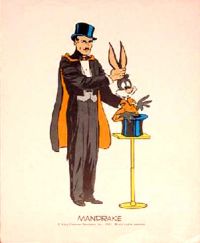1965 KFS Promotional Cards and Stamps: Difference between revisions
mNo edit summary |
m (→Cards) |
||
| (3 intermediate revisions by the same user not shown) | |||
| Line 1: | Line 1: | ||
{{poster | |||
|image= [[Image:BK-premium-card-10.jpg|200 px|]]<br>Mandrake | |||
|Country= [[Image:mini_usa.gif]] USA / English | |||
|}} | |||
The origin of these is uncertain. It has been mentioned that they were premiums from Burger King, but they could also be promotional items from [[King Features Syndicate]]. | The origin of these is uncertain. It has been mentioned that they were premiums from Burger King, but they could also be promotional items from [[King Features Syndicate]]. | ||
==Cards and Stamps== | ==Cards and Stamps== | ||
Comparing the cards and stamps, you'll notice a total of 20 distinct motifs, suggesting that at least 20 different cards and stamps were issued. The absence of printing on the back of the cards indicates that they were not intended for use as regular postcards. Furthermore, the lack of company names or other prints on the back makes it improbable that they were intended as promotional giveaways for a specific company. In this regard, they resemble cards typically dispensed from vending machines, akin to [[Exhibit Card|Exhibit Cards]], rather than conventional advertising materials. | |||
===Stamps=== | ===Stamps=== | ||
These stamps are presented as a pair on a single sheet, connected in the middle by a perforation that allows them to be easily split apart. The back of each stamp is equipped with adhesive that can be activated by moistening, enabling them to be affixed to a surface just like traditional stamps. Each stamp measures approximately 6.35 x 8.9 cm. | |||
<gallery> | <gallery> | ||
Image:KFS-1965-S-01.jpg| | Image:KFS-1965-S-01.jpg| | ||
| Line 14: | Line 22: | ||
===Cards=== | ===Cards=== | ||
These cards, measuring approximately 20.3 x 25.4 cm, bear a copyright date of 1965. Unlike ordinary postcards, which typically feature printed lines for writing the recipient's name and address, as well as space for a greeting, these cards have blank backs with no printing whatsoever. This absence of printed information suggests that they were likely not intended to be used as traditional postcards for mailing purposes. | |||
<gallery> | <gallery> | ||
Image:KFS-1965-C-01a.jpg| | Image:KFS-1965-C-01a.jpg| | ||
Image:KFS-1965-C-01b.jpg| | Image:KFS-1965-C-01b.jpg| | ||
Image:KFS-1965-C-02c.jpg| | |||
Image:KFS-1965-C-02a.jpg| | Image:KFS-1965-C-02a.jpg| | ||
Image:KFS-1965-C-02b.jpg| | Image:KFS-1965-C-02b.jpg| | ||
Latest revision as of 10:29, 1 April 2024
 Mandrake | |
| Country: | |
|---|---|
The origin of these is uncertain. It has been mentioned that they were premiums from Burger King, but they could also be promotional items from King Features Syndicate.
Cards and Stamps
Comparing the cards and stamps, you'll notice a total of 20 distinct motifs, suggesting that at least 20 different cards and stamps were issued. The absence of printing on the back of the cards indicates that they were not intended for use as regular postcards. Furthermore, the lack of company names or other prints on the back makes it improbable that they were intended as promotional giveaways for a specific company. In this regard, they resemble cards typically dispensed from vending machines, akin to Exhibit Cards, rather than conventional advertising materials.
Stamps
These stamps are presented as a pair on a single sheet, connected in the middle by a perforation that allows them to be easily split apart. The back of each stamp is equipped with adhesive that can be activated by moistening, enabling them to be affixed to a surface just like traditional stamps. Each stamp measures approximately 6.35 x 8.9 cm.
Cards
These cards, measuring approximately 20.3 x 25.4 cm, bear a copyright date of 1965. Unlike ordinary postcards, which typically feature printed lines for writing the recipient's name and address, as well as space for a greeting, these cards have blank backs with no printing whatsoever. This absence of printed information suggests that they were likely not intended to be used as traditional postcards for mailing purposes.






















